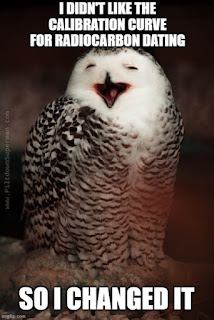Recalibrating Radiocarbon Dating
Once in a while, the unwashed masses get a glimpse into the workings of the secular science industry. Radiocarbon dating is not a closely guarded secret, but people tend to assume that scientists do not make assumptions. That is false. A new calibration for carbon-14 was proposed. To quote Nuke, "It did not go well".
Radiocarbon dating has many variables, and there have been discrepancies between historical records and the presupposition-based dating methods. It's not just creationists who have pointed this out for a mighty long time, secular scientists know it as well. (Biblical creationists have postulated that there were many changes to affect dating results during the Genesis Flood, which have been supported by evidence.) The new method is going to cause consternation and have a kind of ripple effect for established and new results.
 |
| Modified from an image at Pexels by Francesco De tommaso |
To can read the rest of the article at "Radiocarbon Calibration Is Stretchy".The latest calibration curve for radiocarbon dating is raising eyebrows. Will it upset what is “known” about the past?Sometimes “new and improved” is welcome news. For example, the Hubble Space Telescope improved the resolution of faint objects compared to ground-based telescopes tremendously. Without controversy, it has dazzled the world with the beauty of astronomical objects. Other times, though, “new and improved” suggests that what came before was bad. And sometimes one doesn’t want a “new and improved” version of something, like the standard kilogram or meter, because it throws off trusted measurements made prior to the change. Well, now we have a new calibration curve for radiocarbon dating, also called carbon-14 dating. What might be the reaction of scientists and observers to this change?